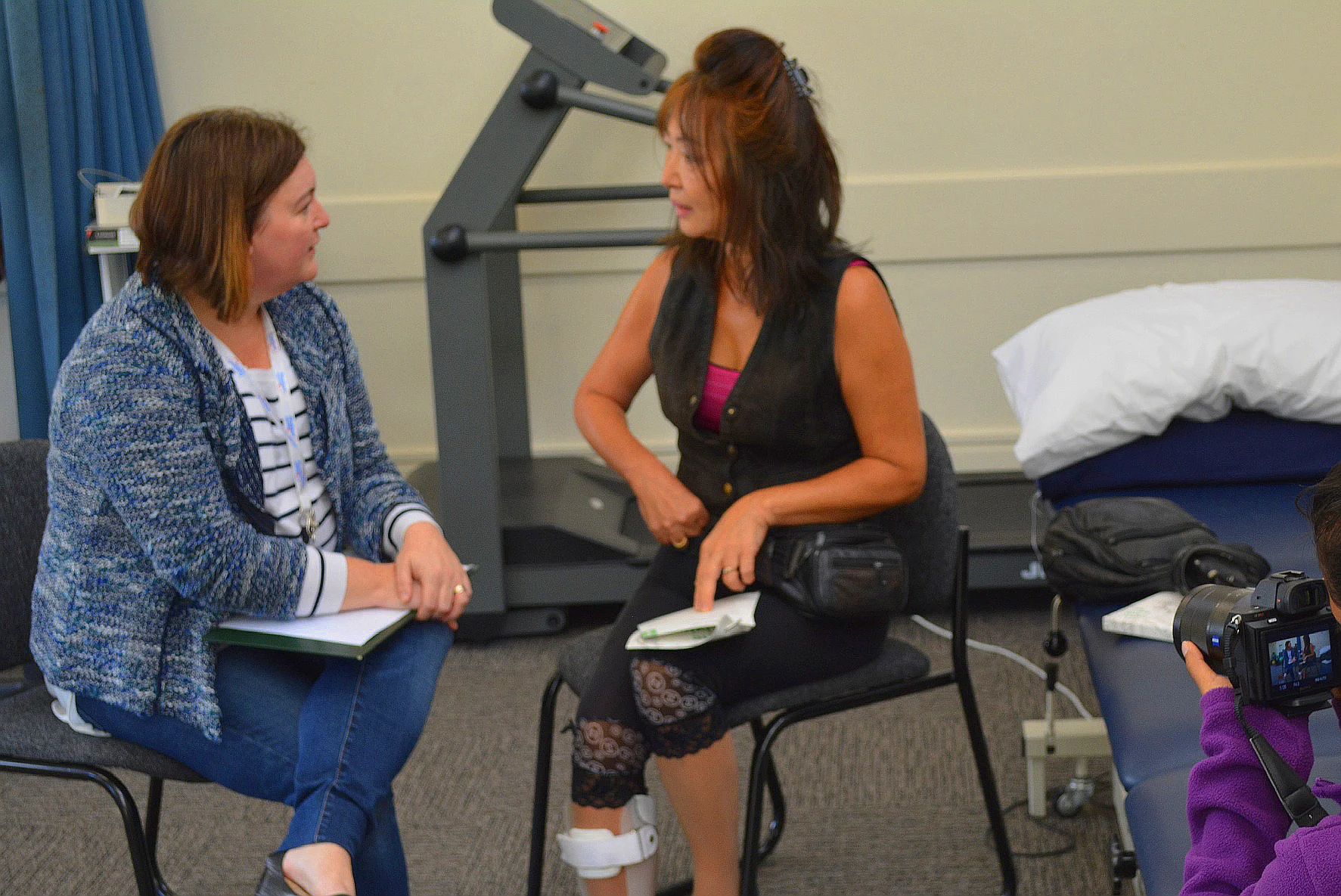2016-AUT Living Well Toolkit
We were on our way to an appointment at Akoranga Integrated Health Clinic (AIH), on the AUT (Auckland University of Technology) North Shore Campus, Auckland. The spacious, very green campus is familiar to us.
AUT is a significant allied health teaching facility in Auckland, and has a range of clinics as well as a Hydrotherapy pool in a dedicated building. I've spent numerous sessions there exercising in warm water to loosen the fascia, and enabling my muscles to be more malleable, more pliant.
Warm water will relax muscles and facilitate active rather than passive movement, The Physiotherapy Department, also housed at this campus promotes mobility, function, and offers targeted exercise programs, and manual therapy. I took particular advantage of the available Physiotherapy and Hydrotherapy sessions.
Not so long ago, we were asked if we'd like to participate in the production of a video to introduce the “Living Well Toolkit”. As a research effort, the Person Centred Research team at AUT have been working on the 'living well toolkit', a tool that may help people with a long term neurological condition to communicate their needs better with health professionals in terms of what is important in their life, and what they wanted from their clinician in order to live better with a long term condition.
Main entry to AUT campus, Northcote
AIH clinic entrance in the background
Initial part of the video shoot
all quiet on the set - action!
The Living Well toolkit is for the patient to share specific relevant information about them and their needs with anyone who is involved in the patients' healthcare. It may help the health professional gain a better understanding of what concerns the patients about his/her healthcare, so that they can customize the patients' care to suit them and their family.
We arrived at AIH, and were met at the spacious foyer by the team. Promoting the Living Well toolkit, and various situations that it could be useful: at home in discussions with family members, or at the clinic visiting the clinicians, and in my case at the gym where physiotherapy and other modalities can be used.
After the day's shooting of the video scenes, I pondered the question and came up with some ideas....
Because I have seen the orthotist to adjust my Ankle Foot Orthosis (AFO) or legbrace, I felt that the toolkit could useful for visits to the orthotic services -possibly to have the husband/mother/friend accompany the patient, who are more fluent with the terminology than the patients themselves, or have a mentor write down in the Living Well toolkit, on behalf of the patient, what issues to discuss with the clinician as a memory jog for the patient.
Patients whose native language is not English, who perhaps needs a friend/interpreter to accompany the patient to the clinician can use the Living Well Toolkit, to verify the needs of the patients and ensure appointments are booked.
Patients who has a number of prescriptions to fill when visiting the pharmacy – the prescriptions can be checked off when filled and the following appointment set up as a reminder
An older person who has had fall, damaged his/her arm or leg, would need to have a variety of services: perhaps physiotherapy for the leg or arm to be in use again, dates and times of each appointment could be in the Living Well toolkit for reference and marked off as required
Occupational therapy work with people who, because of illness, injury or circumstance are limited in their ability to do everyday activities, perhaps advice to install banisters and railings.
Living Well toolkit could come in useful to book: where and when, who would be coming to install equipment, little notes to oneself the questions to ask
Exercise routine which could be documented in the toolkit booklet used as a diary, say; hydrotherapy once a week or pulley system for shoulder-rehab exercises 5 times a day...
Older patients who were hospitalised and now were back at home, on their own: meals-on-wheels for a month or two, the diary aspect of the toolkit would say when the delivery M-O-W, and also documents the non-delivery, dates and times so that it would be easy to phone up and ask where perhaps the patient is unable to do that for herself/himself.
The Living Well toolkit wasn't available when I had the stroke more than twenty years ago; perhaps the journey would have been a lot easier when I first came home from the hospital, in a wheelchair, couldn't do a lot for myself, couldn't speak to say what I wanted or didn't want. But now there are many choices...
The research in the Living Well Toolkit is of benefit to the wider populace of long term neurological conditions, and it is great how the team at AUT value our input, my husband and I. They considered all suggestions; whether to sit discussing the Living Well toolkit in the gym or preparing to write in Living Well Toolkit while waiting in the reception; the right placements of lights if it was very dark in shooting the scene.. It was very energising and it gave more ideas to grapple with and to solve, moving on with the next scenario.
Many thanks to the team at Living Well toolkit (AUT) for this collaboration, especially to: Ann Sezier, Neurological physiotherapist and research officer, and Greta Smith, Programme Manager and research officer, at the PCRC (Person Centred Research Centre) at AUT University.
The Living Well Toolkit is a project under the auspices of the Centre for Person Centred Research (PCR), an interdisciplinary research centre which is part of the Auckland University of Technology (AUT), in Auckland New Zealand.







